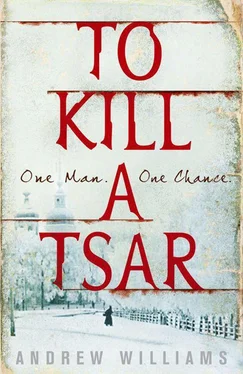‘Working late.’
‘Ah.’
Dobson ushered him through to the study, sweeping papers from a chair and reaching for a bottle of claret that he confessed he had almost emptied already. Words began to tumble tipsily from him. The tsar almost murdered in his own palace — all of Europe would be talking of it in the morning: ‘Escaped by the skin of his teeth, old boy. The skin of his teeth. The tsarevich too. And dozens of guards killed.’
‘A dozen. But many more injured.’
‘Oh? What do you know? By Jove, you’ve come to give me more of the story,’ he said, slipping behind his desk and picking up a pen. ‘Good of you. Is this from your uncle?’
‘The wounded were brought to the Nikolaevsky.’
‘With what sort of injuries?’
Hadfield told him what he wanted to know, of the deaths and the wounded and of the tsar’s visit.
‘He looked ill, you say? Who wouldn’t? He’s not even safe in his own home,’ said Dobson. ‘Uneasy lies the head that wears a crown.’
‘Isn’t that how it should be?’
‘Please, Frederick, don’t attempt to explain or condone this.’ Dobson laid down his pen and leant forward to fix Hadfield with a disapproving look. ‘You know they found the body of a student on the Neva yesterday, his throat cut, almost covered in snow. The terrorists said he was an informer and executed him in the name of the people. Tsar, student, soldier — no one who stands in the way of these Jacobins is safe. Don’t be sentimental. They’re murderers.’
‘I am not going to defend that sort of terror,’ replied Hadfield.
‘What puzzles me is how on earth they managed to get away with it.’ Dobson shook his head in disbelief. ‘My contact told me the police raided one of their apartments two months ago and found a plan of the palace and dynamite. It’s criminal negligence. A drop more?’
Rising from his chair, he crossed the room to a glass-fronted bookcase from which he took another bottle of wine. It was open and Dobson pulled the cork with his teeth.
‘He says he’s met you, by the way.’
‘Who?’
‘My contact in the Gendarme Corps.’ Dobson stepped forward and leant over Hadfield to pour a little more wine into his glass. ‘His name’s Barclay. He’s well connected.’
Hadfield must have jumped a little because his glass clinked against the neck of the bottle.
‘Careful,’ said Dobson, grabbing his hand to steady the glass. ‘Yes, Barclay said he ran into you by chance in a village. One of these nihilist women was teaching at the school.’
He collapsed into the armchair opposite and stretched his legs towards the embers of the dying fire. For the most part, their conversation had been good-natured and bantering, but Hadfield could sense the atmosphere was subtly changing. Of course it was late, Dobson was tired, impatient for his bed, but there was something else; a different note, an almost imperceptible shift in tone, a slyness, as if Hadfield was no longer just a friend but a subject too. Dobson’s bonhomie was of the practised kind, the easy familiarity of the skilful correspondent. He could sense the journalist scrutinising him surreptitiously over the rim of his glass.
‘They didn’t catch her.’
‘Who?’
‘I believe her name was Anna, Anna something. I have a note. Barclay says she worked at a clinic for the poor in Peski.’
Hadfield caught his eye and stared at him belligerently, daring him to say more. But Dobson ignored him and, rising to his feet, picked up the poker and began to stir the fire.
‘Yes, George, I did know her. She worked at the clinic. And, yes, I did visit her house. Barclay clearly told you as much.’
Dobson did not reply but kept prodding the ashes. The little of his face Hadfield could see betrayed no emotion. For a few seconds the silence was broken only by the lazy ticking of a clock and the rattle of the poker against the grate. Then, with a casualness that sounded forced even to his own ears, Hadfield said, ‘Anna Petrovna was a very capable nurse.’
Dobson held his hand for a moment, the poker hovering above the grate, then he began playing with the glowing splinters once more. Hadfield watched him, embarrassed by his clumsy deception. It was so much harder to tell a half truth to a friend than a bare-faced lie to a policeman. All the more so when he was aching to be completely frank.
With nothing more in the fire to reduce, Dobson lifted the poker on to the stand and slumped back in his chair. But almost at once he sprang forward again, hands together, forearms on his broad knees, an intense frown on his face.
‘Look, Frederick. I don’t know if you’re involved in something you shouldn’t be, something illegal…’ He paused for a few seconds to allow for a denial, but Hadfield offered none. ‘As a friend, I’m telling you — cut all contact with these people, with the clinic, with her, if she is the only one you know. To do anything else would be madness. After the attack on the palace — well, I don’t need to tell you. Frederick, are you listening to me?’
‘Yes.’
‘Are you?’ The correspondent was squirming at the edge of his chair, his eyes bright and fixed on Hadfield’s face. ‘You know your uncle will not lift a finger to help you?’
Hadfield felt weeks of anxiety and doubt rising inside him, a barely suppressed torrent of feelings. He wanted to tell Dobson everything. He wanted to say he loved her with a whole-hearted passion that left him powerless to pursue any other course. Feeble-minded, shameful, yes, but, but… ‘She was an excellent nurse.’
Dobson looked at him scornfully, his lips pursed as if sucking something sour, then he leant back abruptly in his chair in a gesture of resignation. They sat in uncomfortable silence for a while, avoiding eye contact, Dobson spinning the stem of his glass on the arm of the chair.
‘Sleep,’ he said at last, rising quickly to douse the lights. ‘You know your way to the other bedroom.’
‘Yes. Thank you, George,’ Hadfield said with quiet emphasis, ‘for everything.’
Dobson turned to look at him with a warm smile. Then, with a small shrug of the shoulders, ‘Remember what I’ve said, Frederick — that will be thanks enough.’
It was the distant but unmistakable crack of a gunshot. Anna shuffled closer to the window and gazed furtively into the street below. Gendarmes were scurrying for the cover of doorways and yards. Someone was shouting. She stepped back for a moment to collect her thoughts, breathing deeply to calm herself. She had come within a hair’s breadth of being caught inside a security cordon but the police had taken her for a passer-by and directed her away. Entering the back of a building in the neighbouring street, she had found a stairwell with a view over the Sapernaya and had watched with rising panic as the gendarmes took up positions. It was a little after six o’clock in the morning and her comrades would have been in their beds. There had been shouts, a hollow thumping, someone inside the flat had smashed windows — the glass showering into the snowy street below — and then smoke had begun pouring from the sitting room. Her comrades must have barred the door and were burning their identity papers and the forged travel passes Anna was to have collected that very morning.
Crack. Another shot. Then another, and more shouting. Anna knew it was her duty now to leave and warn the rest of the party, but her step faltered as the crash of rifle fire reverberated in the street. The gendarmes were now firing through the door of the flat.
It was still dark, the streets almost empty, more so than was customary at that hour. A mad collective fear gripped the city, rumours of attacks to come — bombs in stations and cathedrals and galleries — and the authorities were encouraging people to stay at home. It was harder to move freely, with police and soldiers patrolling the prospekts and at every major junction. She had lost the anonymity of the crowd. Anxious to avoid the main thoroughfares, Anna hurried along alleys and through open yards, pausing every few minutes to check no one was following her. By the time she reached Troitsky Lane it was after seven o’clock and the city was beginning to stir. Stopping a little short of the mansion, she turned into an open doorway and waited in the shadows. Only when she was satisfied she was still alone did she step up to the house, and — after glancing up to find a parasol in Mikhailov’s window — she tugged the doorbell.
Читать дальше












